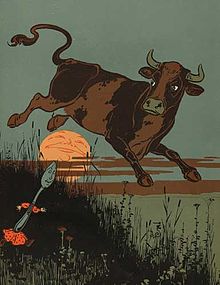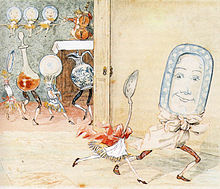Nick and Nora Blue Cow Jumped Over the Moon
| "Hey Diddle Diddle" | |
|---|---|
 Illustration by William Wallace Denslow | |
| Nursery rhyme | |
| Published | c. 1765 |
| Songwriter(s) | Unknown |
"Hey Diddle Diddle" (also "Hi Diddle Diddle", "The Cat and the Fiddle", or "The Cow Jumped Over the Moon") is an English nursery rhyme. It has a Roud Folk Song Index number of 19478.[1]
Lyrics and music [edit]
A common modern version of the rhyme is
Hey diddle diddle, the cat and the fiddle,
The cow jumped over the moon.
The little dog laughed to see such fun
And the dish ran away with the spoon![2]
The rhyme is the source of the English expression "over the moon", meaning "delighted, thrilled, extremely happy".[3]

The melody commonly associated with the rhyme was first recorded by the composer and nursery rhyme collector James William Elliott in his National Nursery Rhymes and Nursery Songs (1870). The word "fun" in the rhyme is sometimes replaced with "sport", "a sight", or "craft".[4]
Origins [edit]

In this Randolph Caldecott rendition, a dish, spoon, and other utensils are anthropomorphized while a cat in a red jacket holds a fiddle in the manner of a string bass.
The rhyme may date back to at least the sixteenth century. Some references suggest it dates back in some form a thousand or more years: in early medieval illuminated manuscripts a cat playing a fiddle was a popular image.[5] There is a reference in Thomas Preston's play A lamentable tragedy mixed ful of pleasant mirth, conteyning the life of Cambises King of Percia, printed in 1569 that may refer to the rhyme:
They be at hand Sir with stick and fiddle;
They can play a new dance called hey-diddle-diddle.[2]
Another possible reference is in Alexander Montgomerie's The Cherry and the Slae from 1597:
But since you think't an easy thing
To mount above the moon,
Of your own fiddle take a spring
And dance when you have done.[6]
The name "Cat and the Fiddle" was a common name for inns, including one known to have been at Old Chaunge, London by 1587.[6]
The earliest recorded version of the poem resembling the modern form was printed around 1765 in London in Mother Goose's Melody with the lyrics:
Hey diddle diddle,
The Cat and the Fiddle,
The Cow jump'd over the Moon,
The little dog laugh'd to see such Craft,
And the Fork ran away with the Spoon.[2]
In L. Frank Baum's "Mother Goose in Prose", the rhyme was written by a farm boy named Bobby who had just seen the cat running around with his fiddle clung to her tail, the cow jumping over the moon's reflection in the waters of a brook, the dog running around and barking with excitement, and the dish and the spoon from his supper sliding into the brook.
In J.R.R. Tolkien's The Fellowship of the Ring, the rhyme was written by Bilbo Baggins, and is part of a much longer narrative poem.
Meaning [edit]
There are numerous theories about the origin of the rhyme, including: James Orchard Halliwell's suggestion that it was a corruption of ancient Greek, probably advanced as a result of a deliberate hoax; that it was connected with Hathor worship; that it refers to various constellations (Taurus, Canis Minor, etc.); that it describes the Flight from Egypt; that it depicts Elizabeth, Lady Katherine Grey, and her relationships with the earls of Hertford and Leicester; that it deals with anti-clerical feeling over injunctions by Catholic priests for harder work; that it describes Catherine of Aragon (Katherine la Fidèle); Catherine I of Russia, the wife of Peter the Great; Canton de Fidèle, a supposed governor of Calais and the game of cat (trap-ball).[2] This profusion of unsupported explanations was satirised by J. R. R. Tolkien in his fictional explanations of "The Man in the Moon Stayed Up Too Late".[7] Most scholarly commentators consider these to be unproven and state that the verse is probably meant to be simply nonsense.[2]
See also [edit]
- List of nursery rhymes
Notes [edit]
- ^ "Roud Folksong Index S298441 Sing hey , diddle 'diddle, the cat and the fiddle". Vaughan Williams Memorial Library. English Folk Dance and Song Society. Retrieved 20 May 2016.
- ^ a b c d e I. Opie and P. Opie (1977). The Oxford Dictionary of Nursery Rhymes. Oxford University Press. p. 202.
- ^ Cresswell, Julia (2010). "moon". Oxford Dictionary of Word Origins. p. 279. ISBN0199547939.
- ^ J. J. Fuld, The Book of World-Famous Music: Classical, Popular, and Folk (Courier Dover Publications, 5th ed., 2000), ISBN 0486414752, p. 502.
- ^ Meetings with Remarkable Manuscripts (Penguin Random House, 2016, 1st ed), Christopher de Hamel, p. 323
- ^ a b C. R. Wilson and M. Calore, Music in Shakespeare: a Dictionary (London: Continuum, 2005), ISBN 0826478468, p. 171.
- ^ S. H. Gale, Encyclopedia of British Humorists: Geoffrey Chaucer to John Cleese (London: Taylor & Francis, 1996), p. 1127.
Source: https://en.wikipedia.org/wiki/Hey_Diddle_Diddle
0 Response to "Nick and Nora Blue Cow Jumped Over the Moon"
Post a Comment